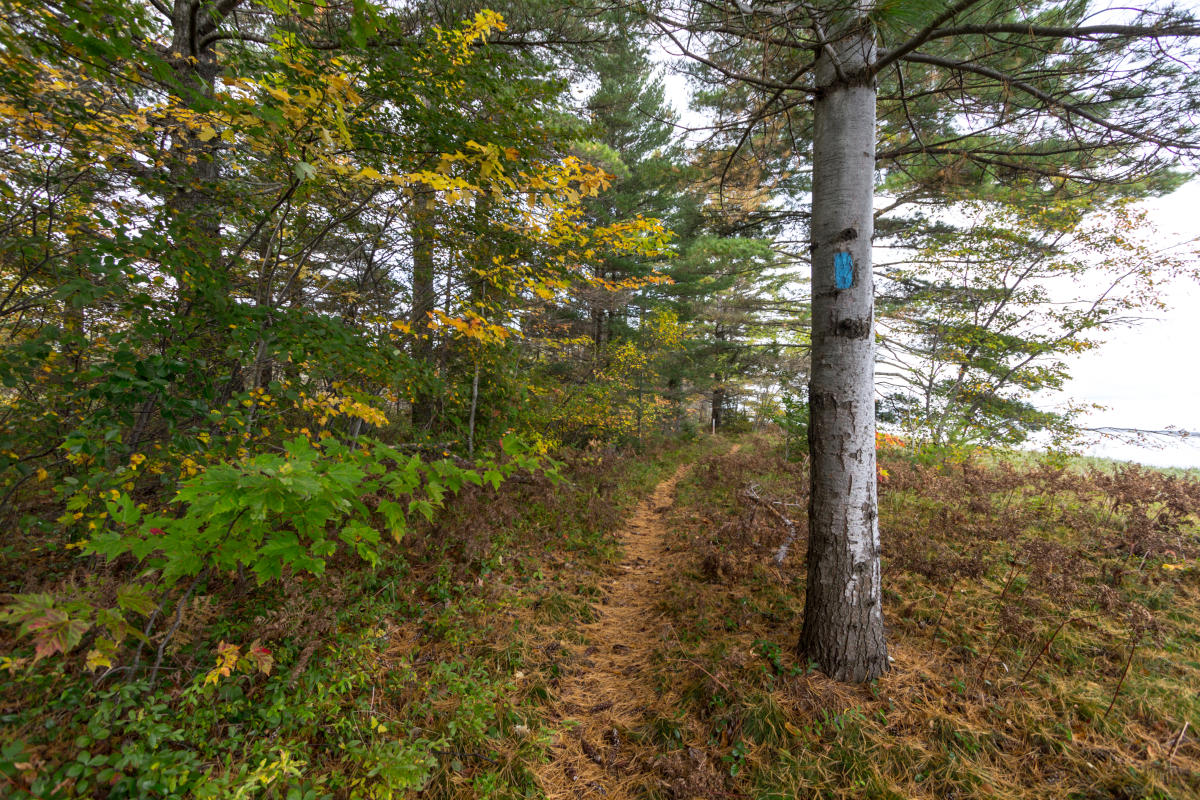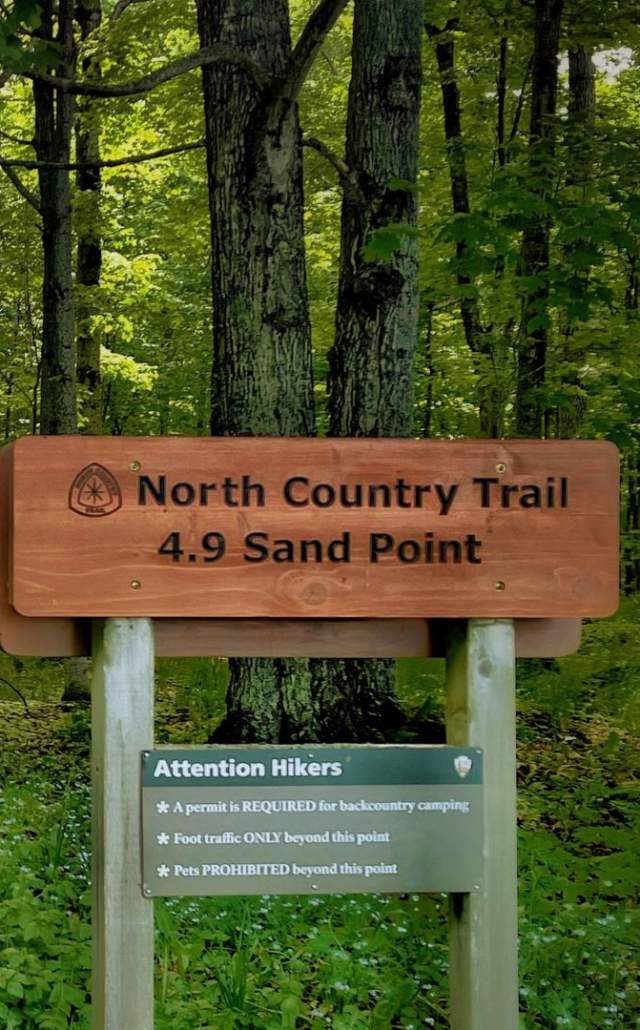North Country National Scenic Trail in the Upper Peninsula
A Backpacker’s Guide
If you are excited to see one of the last great wildernesses in the Midwest, Michigan’s Upper Peninsula is ready to see your footprints on its section of the North Country National Scenic Trail (NCT). The NCT is a jewel in the crown of America's hiking trails, especially for those adventure seekers who thrive on multi-day, long-distance backpacking.
This Backpacker’s Guide will make planning your NCT hike across the U.P. easier. Let’s get started.
Navigating the NCT | Things to See and Do | Where to Stay | What to Pack | Answer the Call of the Wild
The Majesty of the NCT
The NCT stretches an amazing 4,700 miles across eight states, making it one of the longest hiking trails in the United States. It offers a range of challenge levels for those seeking a closer connection with nature and the thrill of exploration.
In Michigan, the NCT carves its way through stunning landscapes for about 1,150 miles in the Upper and Lower Peninsulas. Almost 550 of those miles cross from east to west in the wilderness beauty of the U.P.
The U.P. stretch is where you'll find some of the trail's most breathtaking scenery. You will journey through diverse ecosystems, across rivers and streams, along rugged cliffs overlooking Lake Superior, by waterfalls and historic lighthouses and into the dense, whispering pine forests that hold centuries of secrets.

NAVIGATING THE NORTH COUNTRY NATIONAL SCENIC TRAIL
Whether you are a seasoned hiker or just starting, there is no need to worry about getting lost. The trail in Michigan is well-marked, thanks to the diligent efforts of the National Park Service and a host of dedicated volunteers. Blue blazes and signage guide you along the path, ensuring you can focus on the surrounding beauty rather than where to take your next turn.
You can hike the entire length of the U.P. trail between St. Ignace to the southeast and the Wisconsin border at the western edge of Michigan’s Craig Lake State Park. Or access it at any of the trailheads for shorter backpacking adventures or day hikes.
The U.P. has the most challenging terrain on the NCT. The Porcupine Mountains Wilderness State Park section is very rugged with steep cliffs, wilderness forests and ever-changing weather. But the scenery is incredible!
For a less strenuous hike, the 83 miles of trail through the east zone of the Hiawatha National Forest between St. Ignace and Sault Ste. Marie is relatively flat.
We strongly recommend that you download the free printable maps for the eastern, central and western U.P. and the mobile maps for each region. Cellular service can be spotty along parts of the trail so having a printed version is helpful.
Crossing the Mackinac Bridge
The “Might Mac” or Mackinac Bridge is one of several engineering marvels in the U.P. It is how you will take the NCT across the Straits of Mackinac between Michigan’s Lower and Upper Peninsula. However, you cannot walk across the five-mile bridge except for on Labor Day.
The Mackinac Bridge Authority (MBA) offers a transport service for hikers, 24 hours a day, seven days a week. There is a $5 per person fee for the ride across. No passengers under the age of 18 are allowed in the transport vehicle.
To arrange a ride, call (906) 643-7600 and meet at I-75 Exit 339 (Jamet Street) in Mackinaw City for northbound travel, and at the MBA administration building in St. Ignace for southbound travel.
TOP 12 THINGS TO SEE AND DO ALONG THE TRAIL
Now, let's dive into what makes the U.P.'s portion of the NCT a must-visit for every outdoor enthusiast. Besides miles of beautiful shoreline on Lake Superior, the largest of the Great Lakes, there are so many spectacular sights to highlight we can’t fit them in this blog. Here are 12 must-sees starting from east to west. Please reverse the order if you cross the NCT from Wisconsin.
1. Take a day trip from St. Ignace to Mackinac Island
Coined Michigan’s Crown Jewel, this 3.8-square-mile island in Lake Huron doesn’t allow cars. You’ll arrive by ferry or airplane and then either get around by foot, bicycle or even horse. There are so many centuries of history plus art, shops and outdoor adventure to explore you can easily fill a day.
2. See Michigan’s largest waterfall
The Upper Tahquamenon Falls is not only the largest waterfall in Michigan, but it’s also one of the largest falls east of the Mississippi River. These falls are nearly 200 feet across and 50 feet high. Each second you spend at the viewing platform, up to 50,000 gallons of water flow down the falls right before your eyes!
While at Tahquamenon Falls State Park, hike to the Lower Falls. Here you can walk across a pedestrian bridge to the falls, rent a rowboat to get a closer view and on a warm day, wade into the swirling water.
3. Relax by the Two Hearted River made famous in Ernest Hemingway’s writings
Along the trail, take in the gorgeous scenery and fishing at the mouth of the river as it empties into Lake Superior.
4. Spend two or more days at Pictured Rocks National Lakeshore
You won’t want to miss seeing the grandeur of the ancient sandstone cliffs, the 1874 Au Sable lighthouse, waterfalls, beaches and trails between Grand Marais and Munising. Taking a boat or kayak tour is highly recommended.
5. Discover why Grand Island more than lives up to its name
Two-and-a-half miles west of Munising, catch a ferry across to the Grand Island National Recreational Area. This spectacularly scenic island is home to pristine beaches, towering sandstone cliffs, inland lakes, and old-growth hardwood forests.
6. Play or rock hunt along miles of Lake Superior beaches
The Superior Shoreline and Marquette Chapters are good resources for what beaches to visit along the way. From soft sand dunes to agate-strewn beaches, you will enjoy coming face-to-face with the largest surface area freshwater lake in the world. Among the miles of pristine Lake Superior beaches between Grand Marais and Marquette, consider the more remote Twelvemile Beach or easily accessible Agate Beach, Chapel Beach, Miners Beach, Sand Point Beach, Black Rocks Beach, McCarty’s Cove and Sunset Beach.
7. Stop over in Marquette, the U.P.’s largest city
No worries about this “big” city being crowded and stressful or far removed from the wilderness you love. Marquette has something for everyone — great food, microbreweries, shops and theaters, mountains to climb, beaches and centuries of history to explore.
8. Visit Michigan’s Grand Canyon
The NCT parallels the northern and eastern boundaries of the Sturgeon River Gorge Wilderness. Hike in to see Canyon Falls, the centerpiece of this dramatic gorge.
9. Combine great vistas with a ghost town
For a scenic hike, connect with the 2.7-mile loop Norwich Bluff Trail east of Norwich Road near Ewen.
You can also take a 1.2-mile loop near Ontonagon to visit the Old Victoria Restoration. This is the site of a picturesque copper mining ghost town and where the famous "Ontonagon Boulder" was discovered in the Ontonagon River. The Boulder is now displayed in the National Museum of Natural Science at the Smithsonian Institute in Washington, D.C.
10. Tackle one of the NCT’s hardest challenges
While the Trap Hills section of the NCT is rated moderately challenging, many experienced hikers say this is one of the toughest. Hilly and with sparse water, its rewards are incredible views. Many say this ranks as one of the best hikes in Michigan and the Midwest.
11. Explore the Midwest’s last great wilderness
If you want a true wilderness adventure in the U.S., you will find it along the western U.P.’s section of the NCT. The Porcupine Mountains Wilderness State Park presents unrivaled vistas of Lake Superior’s stunning shores, roaring waterfalls, miles of rivers and streams, 35,000 acres of untamed old-growth forests and 90 miles of hiking/backpacking trails.
Two places you will want to hike to are the Lake of the Clouds Overlook and Summit Peak Observation Tower. Both offer some of the best fall color views in the U.S.
12. Cross from Michigan to Wisconsin
There are 7.5 miles of the NCT that cross Michigan’s most remote state park, Craig Lake State Park, before entering Wisconsin. Ruggedly beautiful, this park is home to hike-in backcountry campsites (reservations only), yurts, rustic cabins, many miles of trail, six lakes, and a variety of wildlife including moose that spend their spring, summer and fall seasons within the park.
WHERE TO STAY
Most multi-day hikers choose to stay in backcountry campsites, established campgrounds or rustic cabins along the trail. Before you arrive, ask the campground or land manager for specific site rules or regulations where you will be camping. Remember to follow fire and wildlife safety rules and leave no trace when you continue your hike.
There are many campsites and campgrounds along the NCT. Check their websites for when they are open and to make reservations. Here are a few from St. Ignace to the Wisconsin border.
- Straits State Park
- Lake Michigan Campground
- Brevoort Lake Campground
- Tahquamenon Falls State Park
- Soldier Lake Campground
- Lake Superior State Forest
- Pictured Rocks National Lakeshore
- Forestville Campground
- Porcupine Mountains Wilderness State Park
- Craig Lake State Park
If you prefer taking day trips on the NCT or staying at indoor lodgings, there are many choices near the trail. Some of the best places to look are in the Trail Towns listed below. Book your rooms ahead to ensure you get the amenities and rates you want.
Restock supplies in NCT Trail Towns
There are three designated Trail Towns in the Upper Peninsula that offer support and services to NCT hikers. These communities are good places to restock your supplies, relax at local restaurants and craft beverage establishments and explore some of the U.P.’s top attractions and festivals.
Trail Towns
WHAT TO PACK
The terrain and weather will change as you hike across the U.P. This requires packing more than for other stretches of the trail. Here are the essentials.
- Cell phone. Service can be spotty in some areas. Be sure to leave your daily hiking plans with someone and update them on any changes.
- Backpack
- Tent, sleeping bag and sleeping pad
- Water bottles, water filter or purification tablets
- Stove, fuel, matches, cookware and utensils
- Garbage bags
- Headlamp or flashlight
- Printed maps and compass
- First aid kit, sunscreen and insect repellent
- Bear bag or bear canister
- Clothing, socks, hiking boots or shoes
- Personal hygiene items
- Warm layers (down jacket or fleece)
- Hat and gloves
- Rain jacket and pants
- Trekking poles
ANSWER THE CALL OF THE WILD
The North Country National Scenic Trail in Michigan's Upper Peninsula is more than just a hiking trail; it's an invitation to adventure, a challenge to push your limits and a journey to be shared. So gather your friends, plan your trip and get ready to create stories you'll tell for years to come.
Let’s go hike the best of the NCT!

